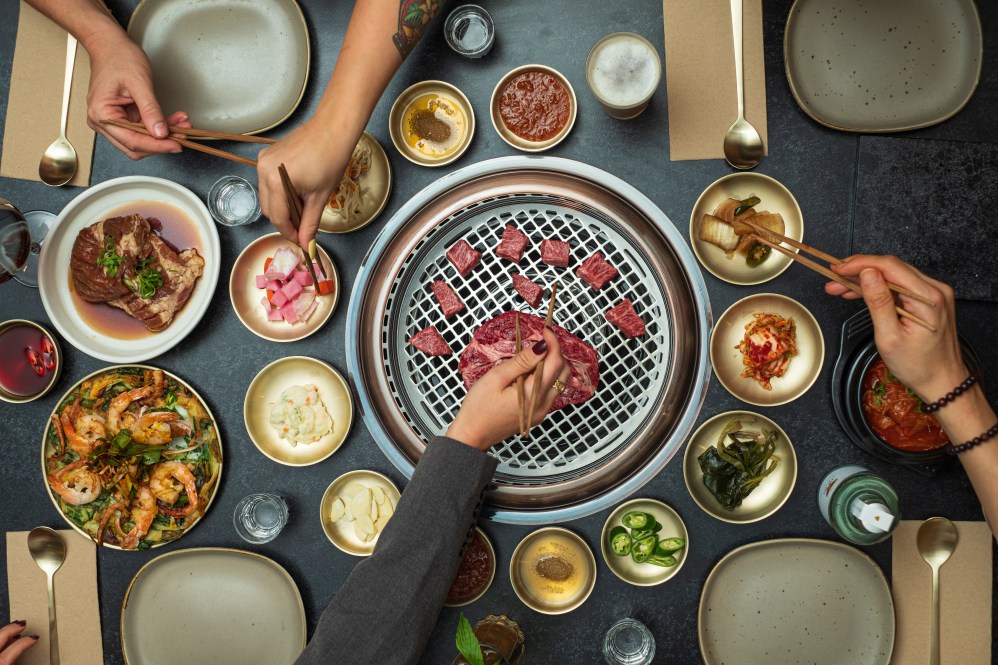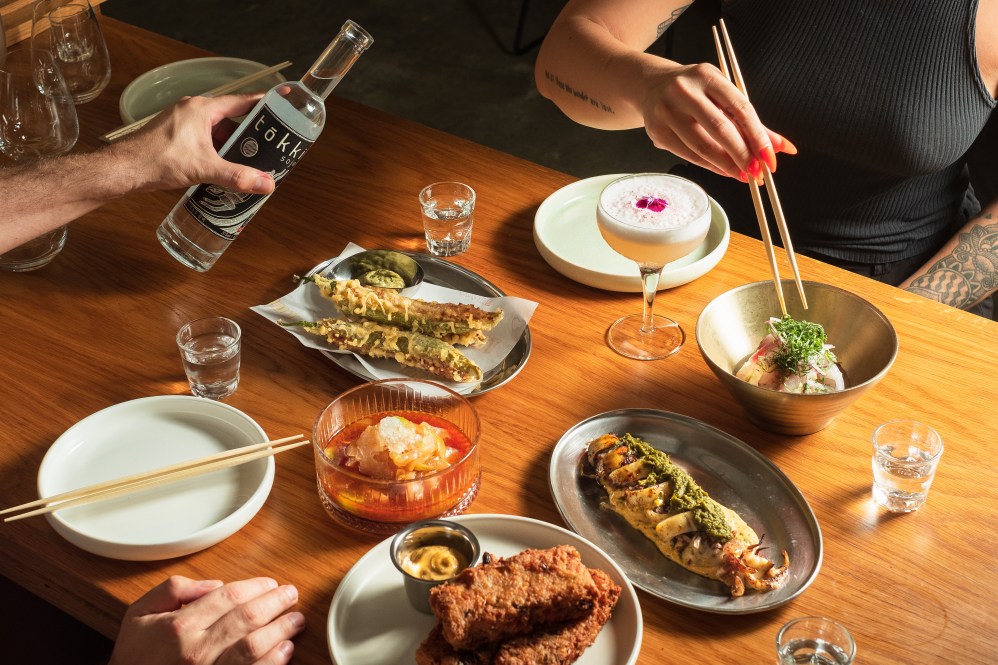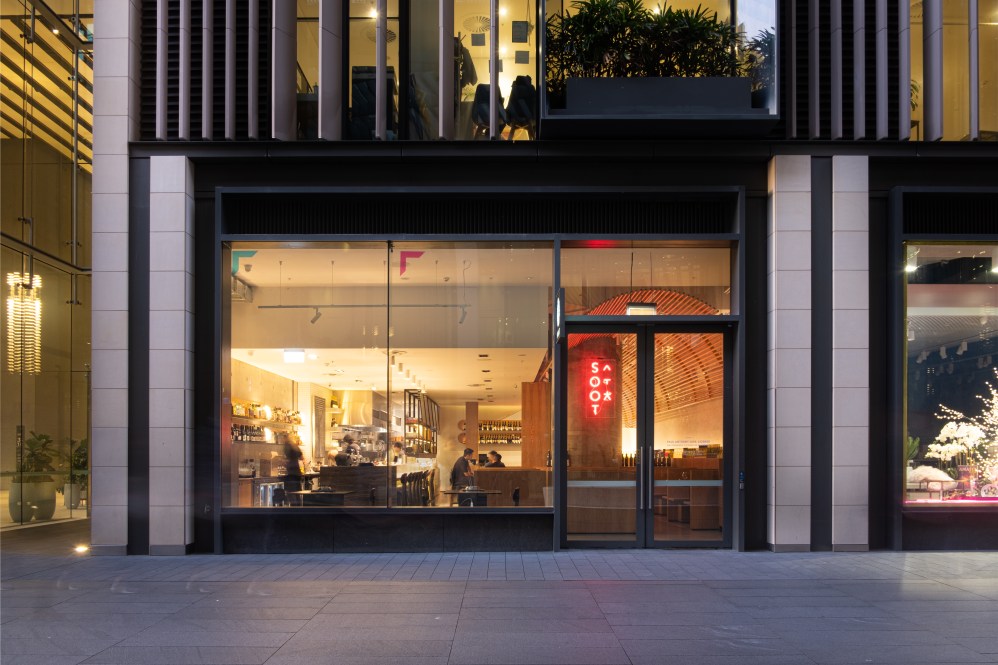David Bae didn’t really have a choice when it came to his career path — it was hospitality or nothing. He essentially grew up in his dad’s venues alongside his brother, sleeping upstairs at a Japanese–Korean takeaway store in Sydney’s Kings Cross and finishing off homework at the city’s first KBBQ restaurant. “I think it was ingrained in us,” he says. “It was in my blood to take my own journey with Korean cuisine.”
The Korean culinary landscape in Australia is metamorphosising, with venues focusing on the five foundational tastes of Korean food: spicy, sour, bitter, sweet, and salty. It’s a shift from the toned-down approach that has long seen dishes muted to cater to Western palates, and signals the start of something very special.
Bae is part of the return-to-roots movement and has brought his venue portfolio together under the name Kolture. He speaks to Hospitality about his upbringing, developing concepts that resonate with diners, supporting chef talent, and why everything is about timing.
David Bae’s father Donald Bae worked in entertainment in Korea before a row with a manager resulted in a snap decision to travel the globe. He ended up in Sydney and attempted to get a job at Network 10. “He couldn’t even speak English, so he had to look for something to survive,” says Bae. “He was really passionate about food, so he started learning how to be a chef and a business owner, and that’s all he did after he landed.”
Bae’s father owned a number of eateries in Sydney, but a Japanese–Korean takeaway shop in Kings Cross and a KBBQ restaurant pack the most punch in the memory category.
“The takeaway was a partnership with his brother,” says Bae. “My dad would do the night shift and I’d sleep upstairs while he would work through. Then he opened a Korean barbecue. We’d go after school and I’d do my homework there, have dinner, and then come home with him. I’ve done everything through restaurants, so I think it was always going to be about continuing to live that out.”
Like his father, Bae has been at the helm of several concepts throughout his hospo career. He was behind Moochi, one of the first frozen yoghurt chains in Australia as well as Vietnamese street food eatery Bun Me, and Korean fried chicken brand K-Bird. But his current portfolio of Korean restaurants is as relevant as ever and caters to the public’s growing interest in authentic Korean dining experiences.
“Korean food hasn’t been on the map until recently,” he says. “Maybe it’s Netflix, K-pop, or diners being more open to Korean culture, but it’s still risky because you can’t just depend on the Korean demographic. Timing is obviously involved, but there was an opportunity to showcase the diversity and variety of the food.”
The nuanced nature of Korean cuisine is demonstrated by the Kolture portfolio, which consists of Tokki, Soot, Kobo, Honey, Kogi, and soon Leemix. Each venue offers something different from omakase at Kobo to makgeolli and anju at Tokki — but they all share a common link.

“Most of the venues I’ve opened are inspired by experiences I’ve had,” says Bae. “I go to Korea often, and the dining scene is on another level. Every time I go there, I think about what experiences would work in Sydney or Australia, and they’re the types of places I’ve brought back and set up over here.”
Each venue opening brings about its own set of challenges, as do established brands, and owners are faced with the reality of running restaurants: remaining agile. “When you’ve been doing things for a while, it’s not just about your passion, you have to make business decisions that make sense,” says Bae.
Both Tokki and Honey have recently undergone a series of modifications, with Bae and Executive Chef Jacob Lee working together to ensure the longevity of both businesses. Tokki launched in 2019 as a Japanese–Korean izakaya but has now morphed into an anju bar.
“Tokki was successful, but it was growing a bit old,” says Bae. “It might have been confusing to the consumer because it was Japanese and Korean, but now we’re just going down the line of being Korean, so it’s a Korean pocha and our version of a sake or wine bar.”
There’s been a shift in focus on the drinks front at Tokki to coincide with Lee’s revised menu, with the group importing Korean beverages spanning from craft beer and premium soju to cheongju, umeshu, and makgeolli. “We’ve been directly bringing in these boutique drinks booming in Korea that aren’t here yet,” says Bae. “It’s an opportunity for us to showcase them at Tokki and pair them with anju from Jacob.”
Honey in Darling Square has also changed its culinary direction, moving away from dishes such as bulgogi pizza to a more traditional offering which includes a bossam tray filled with banchan and different types of ssam. “We’re doing a more authentic take at Honey,” says Bae.
“With the demographic in Darling Square, we had to take a step back and make it more authentic. Before, we were wanting to find foods that weren’t too salty or punchy, but Korean food is what it is — you can’t reinvent the wheel. It was always the fear factor of Korean food, like: ‘Is this too strong for people?’ But it’s been received so well.”

2023 marks a big year for Kolture with the launch of two new concepts and counting. Soot opened in Barangaroo a few months ago and is a space where Australian steakhouse influences collide with KBBQ.
Leemix will arrive shortly after in Sydney Place, with the eight-seater described as the elevated sibling of the Lee-led Kobo. “It sounds biased, but I’ve probably got the most talented Korean chef in the country purely based on Jacob’s understanding of the cuisine,” says Bae. “I’ve given him the autonomy and freedom to come up with certain dishes and that has allowed his talent and colours to flow. He loves music and playing around with dishes, so I said, ‘Why don’t we call it Leemix?’ It’s a fine-dining version of what Kobo is.”
Soot has taken the place of Marble and has been fitted out with a state-of-the-art exhaust system that sees smoke sucked up from tables, not the ceiling. It was an essential part of the brief for Bae, who wanted to combine the social, interactive experience of KBBQ with a premium wine and beverage offering.
“When you go to Korean BBQ, you don’t really expect to have the full bar experience and you’re more accustomed to drinking soju or beer,” he says. The cuts are also a departure from the usual KBBQ selections. “The primary difference is that we’re incorporating more Western cuts including tenderloin and rib-eye. We wanted to bring both worlds together where people can eat, drink, and chat.

A KBBQ buffet in the city is also in the works, as is a high-end KBBQ restaurant in Double Bay which is slated to launch in 2025. While Bae isn’t personally a fan of the buffet format, he says the market is very much there — as is the one for wholesale.
“Wholesale is crying out to me,” he says. “I have a really talented group of chefs around me from my Kogi chef who makes his own kimchi and meat marinades to some ladies I’ve just hired who only do banchan. One has a background in surasang [Royal Court cuisine] where they make 30–40 side dishes and serve them with a bowl of rice. I want to get Korean food on the shelves and be a part of that space one day.”
Kolture is emerging as a serious player in restaurant landscape with venues that are very much on the cutting edge for Sydney. Seoul may be 10 years ahead, but there’s plenty of time to play catch up.
Sponsored Content

Discover Dairy Farmers’ range of shredded cheese
Sponsored by Bega

Beachfront Melbourne Club catering & restaurant opportunity
Sponsored by Future Food
Trending Now
Resources
Lorem ipsum dolor sit amet, consectetur adipiscing elit. Fusce ac ornare lectus. Sed bibendum lobortis...
Lorem ipsum dolor sit amet, consectetur adipiscing elit. Fusce ac ornare lectus. Sed bibendum lobortis...
Sign up for our newsletter
